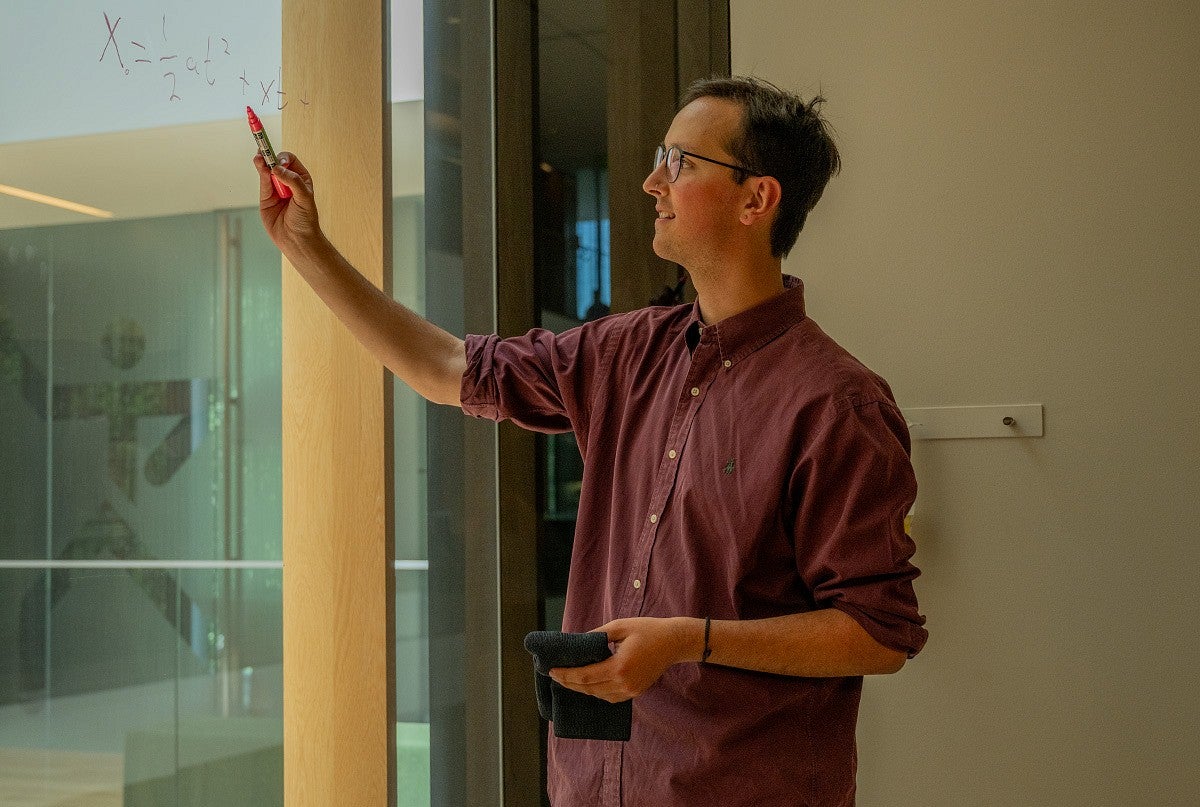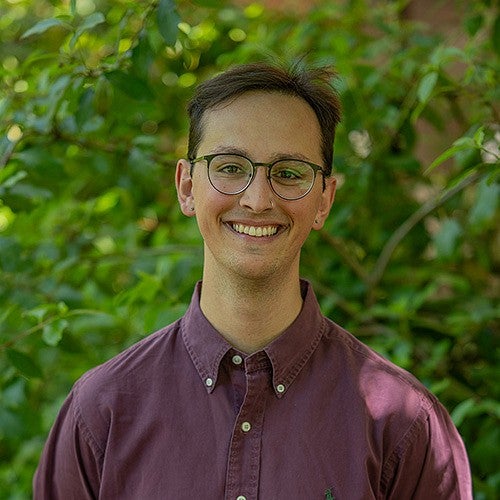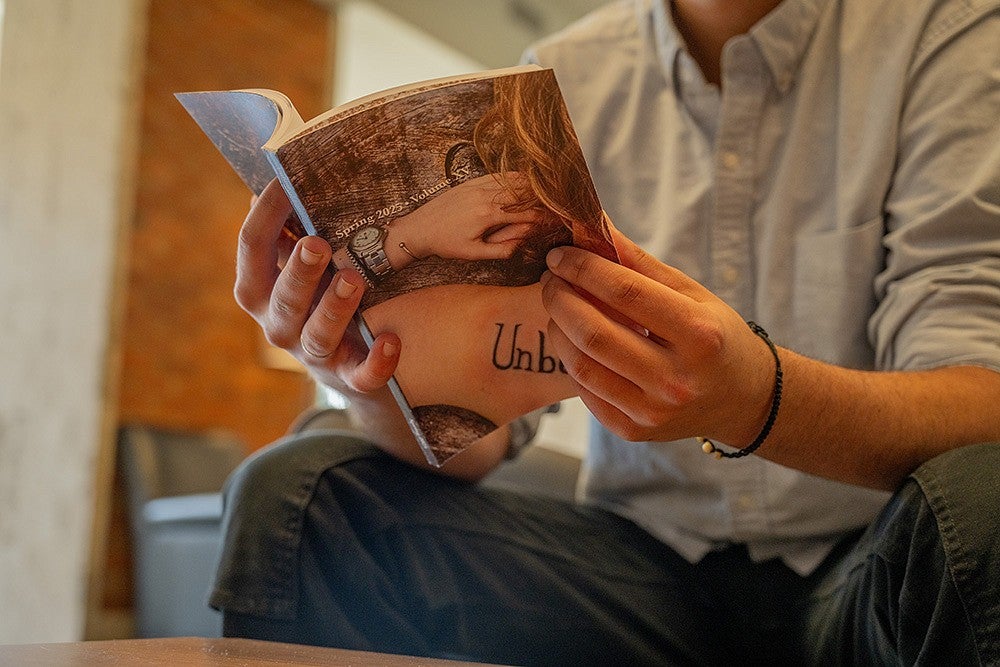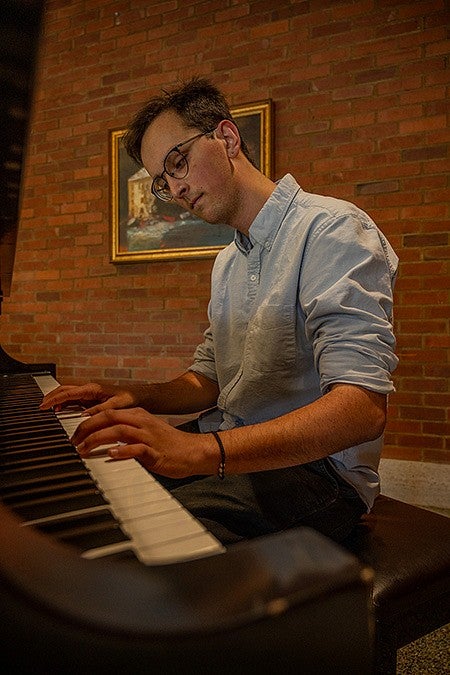
Starting a conversation
In his time as a Clark Honors College student, Nathan King has experienced the pain of learning hard truths. An environmental science major, King has studied the ways global systems are creating problems that feel immense. But even in moments of being overwhelmed, he reminds himself he doesn’t need to solve everything at once.
It’s a strategy he uses when he tutors student athletes at the John E. Jacqua Academic Center, King says. A student there was recently struggling with a three-part math problem. “You don’t have to do it all,” King told the person. “’You can do one step, and then the next, and then the next, and you understand each of those. Eventually, you can get good enough to put it all together and do it at once.’ It’s the same thing with these big ideas.”
The tutoring gig is one King deliberately chose for a chance to work with a group of students he doesn’t interact with otherwise. It’s an example of how he positions himself to connect with differing perspectives, creates space for conversation, and looks forward to the exchange.
“I’m so thankful for a university setting,” he says. “There are so many people with so much that they’re thinking about that I’m not thinking about, and vice versa, and we can just talk.”

Nathan King
Major/minor: Environmental Science and Spanish double major, Creative Writing minor
Hometown: Corvallis
Coffee or tea: Lightly brewed coffee. Or black coffee. Or peppermint tea. Or anything with a good conversation.
Song on repeat: Walkin’ Back to Georgia by Jim Croce
Thesis title: Brazilian Industrial-Scale Agriculture: A Longitudinal Geospatial Analysis of Soybean Production in Mato Grosso
Favorite experience from the HC: The courses I took my first term, The Psychology of Pilgrimage and African Philosophy, set the bar high for the HC. I haven’t been disappointed since!
Advice for incoming first-years: Slow down. Take your headphones out, put your phone away, and look around. Enjoy the food you eat. Spend time with people that expand your mind. Choose your words. If you find yourself going through the motions, take a step back. Find activities that relax your mind and do them regularly. Be curious and patient.
I’m grateful for: My family, friends, advisors, coworkers, partner, and peers. I would not be half the person I am today without the continued encouragement from my community.
This summer, I can’t wait for: free time! I’m looking forward to spending more time gardening, playing piano, writing poetry, and doing independent research.
Next steps: I plan on moving to Portland, OR this summer! I hope to work on an agricultural project, either through hands on data collection and analysis or with remotely sensed data. I’d like to work on a project that promotes sustainable and regenerative agricultural practices.
King hopes to influence a larger societal change with his thesis project, aimed at exposing the impacts of the global meat industry. A lifelong vegetarian, King has been aware of environmental issues since he was a young person and sees agriculture at the crux of where people can have a major impact, for good or bad.
His research looked at soybean production in the Mato Grosso state of Brazil, now the top producer of the commodity crop that is used to feed cattle worldwide, and what that has meant over time for the region and the global economy.
“I’ve found it’s just a really good case study for everything I’ve learned about agriculture,” King says. He is upfront about wanting to change people’s minds about eating meat. But rather than preaching, he’s hoping to start a dialogue. Opportunities to do that are what he’s loved most about being in the Honors College. “So often, you get in an argument with someone, and you end up just talking for a few hours,” King says.
It’s clear that King delights in having his assumptions challenged, and if he’s preaching anything, it’s that everyone he encounters should stay curious and never stop asking questions.
He was born in northwestern Montana, the youngest of three brothers, into a homesteading lifestyle. His parents, who both worked remotely, moved the family to Corvallis when he was small. They chose the community intentionally, hoping it would give the kids a more well-rounded life, says his mom, Toni King.
Nathan King always had a lot of questions. “We talked about how the world works a lot when he was growing up,” says his mom, who was a physics and astronomy instructor. “I really enjoy discussing how things work, and what’s going on in the world, and looking at things on a deeper level.”
A tendency to lead emerged early on. Nathan King played basketball in fifth grade. “Coach on the floor" was his nickname. “He kind of got that everywhere,” Toni King says. “He liked to figure out the big picture and direct everything.”
In eighth grade, a class project let him share with his peers that the meat industry is the leading carbon dioxide producer globally, not transportation, as many believed. Though it foreshadowed his academic inclinations, the topic was back-burnered in his mind.
King entered the Honors College, which he did with the support of a PathwayOregon scholarship, studying psychology and Spanish. Then he took a class in the CHC with an affiliated faculty member, David Meek, called Global Wellbeing.
The class’s themes of social cohesion, human health and planetary health reawakened a concern for the environment in King. An interdisciplinary scholar of environmental anthropology, critical geography, and food systems, Meek would go on to become King’s thesis advisor.
Along the way, King developed a keen interest in creative writing that led him to join the student-led Unbound literary arts journal two years ago. Graduating with a minor in creative writing, he became the editor-in-chief.

Under King’s leadership, Unbound’s staff has grown from eight to 25. Its budget has more than quadrupled to $9,000, and after almost dying during the pandemic, the publication is not only revived but being printed again. This year’s issue launched at the end of May.
Though he enjoys writing and editing, the community of creative writers is the core appeal of Unbound for King. This year, he kicked off a series of events that invited writers to meet over food, share their work and talk. Coming together inspired and encouraged everyone. “Writing can be a very isolating experience,” he says.
In Honors College 277 Thesis Orientation, the class sophomores take to begin thinking about their thesis projects, King met Yalda Asmatey, a CHC instructor who became a close mentor.
“Nathan came into the class with a kind of spirit in which he was so open and eager to learn, and he has a way of being with people. He engages everyone who’s present. He’s always asking questions,” says Asmatey. “He wants to really, deeply, authentically know people and in that spirit, he very much is a qualitative researcher.”
As Asmatey has watched King develop his thesis idea and pursue other interests, she’s struck by how he has come to embody the kind of self-aware, empathetic leader the CHC aims to send off into the world.
“He’s not interested in standing on the sidelines,” she says. “Nathan is very much invested in engaging with people’s hearts and minds, and collaborating in ways that further ignite the creative possibilities for change in this world.”
King’s thesis project was deliberately challenging. Though he worked with Meek, much of his research was independent and done through CHC's independent study credits option. King figured diving into something totally new would serve his lifetime love of learning.
“I basically picked Brazil (because Meek studies it), and from there I did so much reading, because I knew zero,” says King. “I wanted to have no knowledge, so it was the most difficult.”
He zeroed in on Brazil’s agricultural transformation over the last 70 or so years, in which the country has gone from being a major importer to a leading exporter of food. To show this, he used 18 years of soybean data from Mato Grosso, a state that is half rainforest, half savannah and is being rapidly converted to agricultural land.
His interest in soybeans traces back to his vegetarianism, which more recently became veganism. “People are eating more meat in India and China than they ever have before,” King says. “That demand pulls so hard on agriculture systems, and I learned that pull is happening in Brazil.”

Along the way, King made many mistakes in both methodology and theory in the project that he’s grateful to have learned from.
Agriculture in Brazil is so different from the U.S., and King says his mind was blown by how many wrong assumptions he had. “‘Nope. Stop having those assumptions about other systems,’” he told himself over and over. “‘You don’t know how they work.’”
These experiences forced King to change his mind and keep it open, something he hopes the audience for his thesis project might also consider.
“I know a lot of people here that, if they were to read my thesis, they would change the way they act, probably, so that it aligned with their ethical position,” he says.
As a graduate of the CHC, King is anticipating a huge release of pressure into a more intentional slowness. He’s looking forward to writing poetry, playing the piano, and eventually moving to Portland with his partner.
He says he’d like to work in support of sustainable agriculture, ideally on a data analysis project. He’s also considered teaching English or Spanish abroad. Above all, as his awareness of the world grows, he’ll be ready for the growing pains that come with new realizations.
“I’ll come to terms with something, and then I’ll think that I’m done, I’ve overcome that feeling,” he says. “Then I’ll learn more and it happens again. I’ve come to the realization that’s probably going to be a lifelong conversation.”

